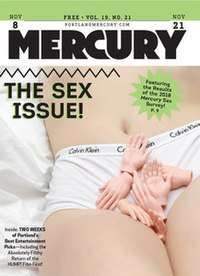Portland Mercury
Portland Mercury is an alternative bi-weekly newspaper and media company founded in 2000 in Portland, Oregon. Its revenue model is strongly connected on advertisement and sales of tickets for events and concerts.[2] Nearly 95% of its revenue comes from advertisement.[3]
 | |
| Type | Alternative bi-weekly |
|---|---|
| Format | Tabloid |
| Owner(s) | Index Publishing |
| Publisher | Rob Thompson |
| Editor | Wm. Steven Humphrey |
| Founded | June 2000 |
| Language | English |
| Headquarters | 115 SW Ash St., Suite 600 Portland, OR 97204 USA |
| Circulation | 45,000 (as of June 2014)[1] |
| Website | www |
It has a sibling publication in Seattle, Washington called The Stranger.[4]
Contributors and staff
Editor-in-Chief: Wm. Steven Humphrey
Executive Editor: Erik Henriksen
News: Alex Zielinski, Blair Stenvick
Music: Jenni Moore
Food: Andrea Damewood
Movies & TV: Erik Henriksen
Arts: Suzette Smith
Copy Chief: Robert Ham
Calendar: Bobby Roberts, Chipp Terwilliger
Current list retrieved on November 7, 2019.[5]
Portland Mercury has also published the work of a number of notable writers and personalities including: Chelsea Cain, Chuck Palahniuk, Dan Savage, David Schmader, and Sean Tejaratchi.
Contents
Along with a regularly updated website and blog titled Blogtown, a print edition is released bi-weekly. The publication chronicles the Portland music scene and features news and political articles, interviews, editorials, humorous columns, reviews, and cultural event listings. It also publishes Dan Savage's long-running syndicated advice column Savage Love and comic strips including: Maakies, Kaz's Underworld, and Idiot Box.
Columns
Portland Mercury publishes columns that often have a satirical or humorous tone. The publication's established columnists have included Dan Savage, Ann Romano, and Ian Karmel. The paper also often features fictional columns written by characters from pop culture or those created by members of the staff. These columns have included Elementary School Crime Blotter by Jerry Masterson, Imbecile Parade by Frank Cassano, and One Hulk's Opinion by the Incredible Hulk.[6]
History
The current Portland Mercury launched in June 2000.[7] The paper describes their readership as "affluent urbanites in their 20s and 30s."[8] Its print edition was published weekly until fall 2018[9] when it changed to bi-weekly beginning with the issue released on September 13, 2018.[10] The paper's name as displayed on the nameplate was shortened to just Mercury as well.[9][11] On March 14, 2020, during the COVID-19 pandemic, the paper temporarily suspended print publication and switched to online only.[12] In addition, it laid off 10 employees, which comprised half of the publication's staff.[13][14]
The original Mercury
A weekly newspaper called The Mercury and later The Sunday Mercury was founded in Salem in 1869,[15] and moved to Portland a few years later.[16] Oregon writer Homer Davenport described approaching the Mercury when he arrived in Portland as a young man, and being sent to New Orleans to cover and draw pictures of the Fitzsimmons-Dempsey fight.[17]
The Mercury was best known for being the subject of a major libel lawsuit involving attorney and writer C.E.S. Wood. The Oregon Supreme Court ruled against O. P. Mason and B. P. Watson, and the newspaper itself was turned over to receiver A. A. Rosenthal. Rosenthal promised to "make a decent paper of it," but the paper was raided by the Portland district attorney's office later that year and suppressed for publishing offensive material. An article later published in The Oregonian praised the plaintiffs for having "abolished a publication insidiously demoralizing as well as unspeakably offensive."[18]
References
- "The Portland Mercury". Association of Alternative Newsweeklies. Retrieved April 19, 2019.
- Mesh, Aaron (March 14, 2020). "Portland Mercury Halts Print Editions Amid Coronavirus Shutdowns". Willamette Week. Retrieved 2020-04-29.
- Meza, Claudia (March 17, 2020). "How Alternative Weeklies Are Weathering The Pandemic". www.opb.org. Retrieved 2020-04-29.
- Meza, Claudia (March 17, 2020). "How Alternative Weeklies Are Weathering The Pandemic". Oregon Public Broadcasting. Retrieved 2020-04-27.
the Mercury and its Seattle sister paper, The Stranger
- "Masthead". Portland Mercury. November 8, 2019. Retrieved November 8, 2019.
- Hulk, Incredible. "Articles by the Incredible Hulk". Portland Mercury. Retrieved April 16, 2020.
- Humphrey, Wm. Steven (June 1, 2000). "The Triumphant Return of The Mercury". Portland Mercury. Archived from the original on November 15, 2008. Retrieved April 19, 2019.
- "Ad-info".
Mercury readers are affluent urbanites in their 20s and 30s with impressive disposable incomes and an appetite for everything the city has to offer.
- Gormley, Shannon (May 24, 2018). "Starting This Fall, The Portland Mercury Will Publish a Paper Every Other Week". Willamette Week. Archived from the original on April 15, 2019. Retrieved October 12, 2019.
- Humphrey, Wm. Steven (September 12, 2018). "Good Morning, News: Merkley Spills the Tea, GOP in Serious November Trouble, and the New Biweekly Mercury". Portland Mercury. Archived from the original on January 24, 2019. Retrieved October 12, 2019.
- "Portland Mercury, News, Entertainment, Trouble". web.archive.org. September 13, 2018. Retrieved April 15, 2019.
- "The Mercury Is Temporarily Switching to Online Only". Portland Mercury. Retrieved 2020-04-16.
- Davis, Rob (2020-03-14). "Portland Mercury temporarily cuts 10 staff, will publish online only". oregonlive. Retrieved 2020-04-26.
- "Coronavirus woes causing cutbacks at Portland Mercury". Portland Tribune. March 14, 2020. Retrieved 2020-04-28.
- Turnbull, George Stanley (1939). . . Binfords and Mort.
- Ludington, Flora Belle (1927). . Oregon Historical Quarterly. 26.
- wikisource:en:The Country Boy/Chapter 5
- Turnbull, George Stanley (1939). . . Binfords and Mort.